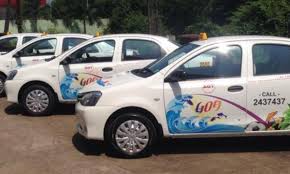In Goa, app-based taxis might finally make an entry — and local cabbies aren’t happy

Goa, a popular tourist spot famous for its beaches and nightlife, is about to see a big change in how people get around. After many years of debate, app-based taxi services like GoaMiles might officially launch soon. These apps promise easier and fairer rides for tourists and locals. But local taxi drivers are worried. They fear these new services will threaten their jobs.
Why Change Was Needed
For years, Goa’s taxi scene has been dominated by local operators. These drivers own or rent their vehicles and follow informal systems. Many tourists complain about unclear fares and sudden price hikes. The system lacks transparency and regulation. To fix these problems, the Goa government started promoting app-based taxi services. These apps offer clear pricing, cashless payments, and GPS tracking. GoaMiles, a local app, was tested successfully but faced strong resistance from taxi unions.
Local Taxi Drivers Fight Back
Taxi unions, such as the All Goa Taxi Union Association, strongly oppose these apps. They say the apps will lower fares and cut into their earnings. Many local drivers depend on fixed fare rates and steady business. They fear losing their livelihood. Traditional taxi driving is often a family tradition passed down through generations. Drivers worry apps favor younger, tech-savvy people and outsiders. They believe the government’s push hurts their businesses and local culture.
These unions also worry that some app drivers might not follow government rules or have proper permits. They have protested and demanded strict enforcement of local laws. Their goal is to protect their rights and jobs.
Government Tries to Balance Interests
The government is in a tough spot. On one side, tourists and residents want better, more reliable taxi services. On the other side, many local drivers need protection. To address this, Goa introduced the ‘Goa Transport Aggregator Guidelines, 2025.’ These rules require all app services to register with the government and ensure drivers have proper permits. They also set standard fare limits. The aim is to make the market fair for everyone.
Despite these rules, many taxi drivers remain doubtful. They fear app taxis will eventually dominate despite regulations.
The Political Side
This issue has political layers. Some politicians support taxi unions, seeing them as protectors of Goa’s culture and economy. They warn that app taxis might cause job losses and harm local communities.
Others say Goa must modernize to attract global tourists. They believe apps improve safety and service quality. This divide shows the challenge of balancing progress with protecting workers.
Finding Middle Ground
There might be a solution that works for all. Experts suggest bringing local taxi drivers onto app platforms. Training and support could help traditional drivers use these apps. This way, they can reach more customers without losing their independence.
A hybrid model could also work. This would let customers book either app taxis or traditional ones through a single platform. Such ideas could preserve jobs and culture while giving people modern services.
What This Means for Goa’s Future
App-based taxis could change Goa’s transport for the better. They promise fair pricing, safety, and convenience. But local drivers’ concerns highlight the risks of change.
Goa must find a balance. Policymakers, app companies, and taxi unions need to work together. Protecting livelihoods while embracing new technology is key.
Goa’s future as a top tourist spot depends not just on its natural beauty but also on fair and inclusive progress.






